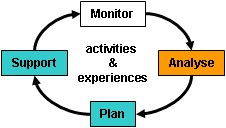![]()
----------------
See also...
Where the functional summary fits
The original version of the Planner began with support Actions.
The second version added Incidents in order to be able to monitor problematic behaviour. This concept was expanded to include Concerns and later all sorts of Observations
- incidents
- concerns
- queries
- achievements
- progress summaries
- ....
ISPs (individual support plans) were added in Version 3 to help shape everyday support for students and to enable daily monitoring.
The MAPS continuous improvement cycle
The inclusion of a functional summary component in Version 4.0 completes a continuous improvement cycle
- Monitor what is happening -> Analyse observations -> Plan support -> Support: arrange and act -> Monitor .....
The MAPS Cycle
Functional analysis as knowledge work
Summarising observations (only some of which are recorded as data) is an important form of knowledge work. Only people can do knowledge work.
Improving the Planner to promote and support functional analysis is an important development. Version 4 assists users in some aspects of functional analysis. For example it
- separates out certain categories of data (incidents, weekly monitoring, recent observations) and
- presents certain data in formats that are likely to reveal any underlying patterns (days of the week, times and locations, types...)
Thus the Planner allows users to undertake a kind of dynamic functional analysis,
the results of which can be captured as the Functional Summary.
The Planner does not actually do functional analysis but the new component allows users to maintain and integrate a dynamic summary of key data related to the functional capabilities of students. For this reason this is now referred to as the functional summary component.
In the hectic activity of schools it is often difficult to step back and capture those key factors related to the student's success and well-being.
The data about any student are likely to be incomplete and sometimes it will be necessary to Guess and Check to investigate what works [thanks to Mario Bergamin and Young Town Primary School for this tool]:
For example, it may be important to make insightful distinctions, such as whether...
- The student does not have the skill level.
- The student has the skill level but is not motivated
- The student has the skill level, motivated but lacks discrimination of where/when to use it.
Capturing these insights and making them available to others (and to oneself) in the future will reduce the almost continuous loss of knowledge that occurs in busy schools. This summary is also useful for demonstrating progress (or lack thereof).
Consider the following hypothetical students record:

- In April 2007 the senior staff (management team = MT) recorded that the student had
a tendency to leave the school when things go wrong
- In April 2008 this functional observation was judged to be no longer applicable (NLA)
- This student's class teacher nominated frequent late arrivals at school as being unhelpful and something worthy of attention
- And the school psychologist (GO = Guidance Officer) has advised that this student has difficulty understanding simple instructions
The value of a functional summary
The value of these items is that they are likely to be helpful in
- clarifying the goal for the student:
is it
- desirable...does it reflect the priorities?
- possible... can it be achieved?
- feasible for this student... can it be achieved in the near future, given the student's situation?
- suggesting everyday support (ISP items) that may assist the student to achieve success and well-being
- suggesting other specific support actions that could also be helpful
- reducing the knowledge lost over time
- monitoring progress (especially developmental progress)
- ...
All comments and feedback is welcome - click here

